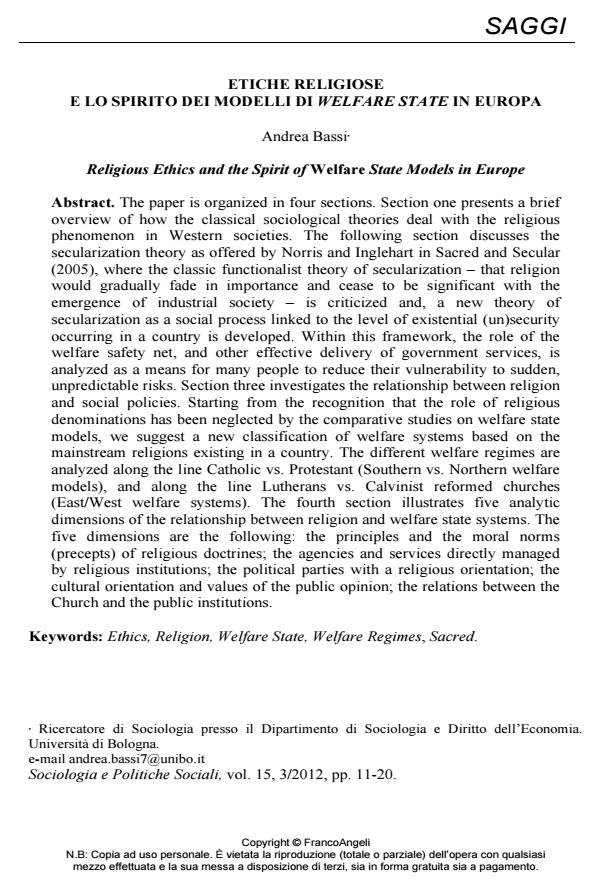Etiche religiose. E lo spirito dei modelli di welfare state in Europa
Titolo Rivista SOCIOLOGIA E POLITICHE SOCIALI
Autori/Curatori Andrea Bassi
Anno di pubblicazione 2013 Fascicolo 2012/3 Lingua Italiano
Numero pagine 10 P. 11-20 Dimensione file 209 KB
DOI 10.3280/SP2012-003002
Il DOI è il codice a barre della proprietà intellettuale: per saperne di più
clicca qui
Qui sotto puoi vedere in anteprima la prima pagina di questo articolo.
Se questo articolo ti interessa, lo puoi acquistare (e scaricare in formato pdf) seguendo le facili indicazioni per acquistare il download credit. Acquista Download Credits per scaricare questo Articolo in formato PDF

FrancoAngeli è membro della Publishers International Linking Association, Inc (PILA)associazione indipendente e non profit per facilitare (attraverso i servizi tecnologici implementati da CrossRef.org) l’accesso degli studiosi ai contenuti digitali nelle pubblicazioni professionali e scientifiche
The paper is organized in four sections. Section one presents a brief overview of how the classical sociological theories deal with the religious phenomenon in Western societies. The following section discusses the secularization theory as offered by Norris and Inglehart in Sacred and Secular (2005), where the classic functionalist theory of secularization - that religion would gradually fade in importance and cease to be significant with the emergence of industrial society - is criticized and, a new theory of secularization as a social process linked to the level of existential (un)security occurring in a country is developed. Within this framework, the role of the welfare safety net, and other effective delivery of government services, is analyzed as a means for many people to reduce their vulnerability to sudden, unpredictable risks. Section three investigates the relationship between religion and social policies. Starting from the recognition that the role of religious denominations has been neglected by the comparative studies on welfare state models, we suggest a new classification of welfare systems based on the mainstream religions existing in a country. The different welfare regimes are analyzed along the line Catholic vs. Protestant (Southern vs. Northern welfare models), and along the line Lutherans vs. Calvinist reformed churches (East/West welfare systems). The fourth section illustrates five analytic dimensions of the relationship between religion and welfare state systems. The five dimensions are the following: the principles and the moral norms (precepts) of religious doctrines; the agencies and services directly managed by religious institutions; the political parties with a religious orientation; the cultural orientation and values of the public opinion; the relations between the Church and the public institutions.;
Keywords:Ethics, Religion, Welfare State, Welfare Regimes, Sacred.
Andrea Bassi, Etiche religiose. E lo spirito dei modelli di welfare state in Europa in "SOCIOLOGIA E POLITICHE SOCIALI" 3/2012, pp 11-20, DOI: 10.3280/SP2012-003002